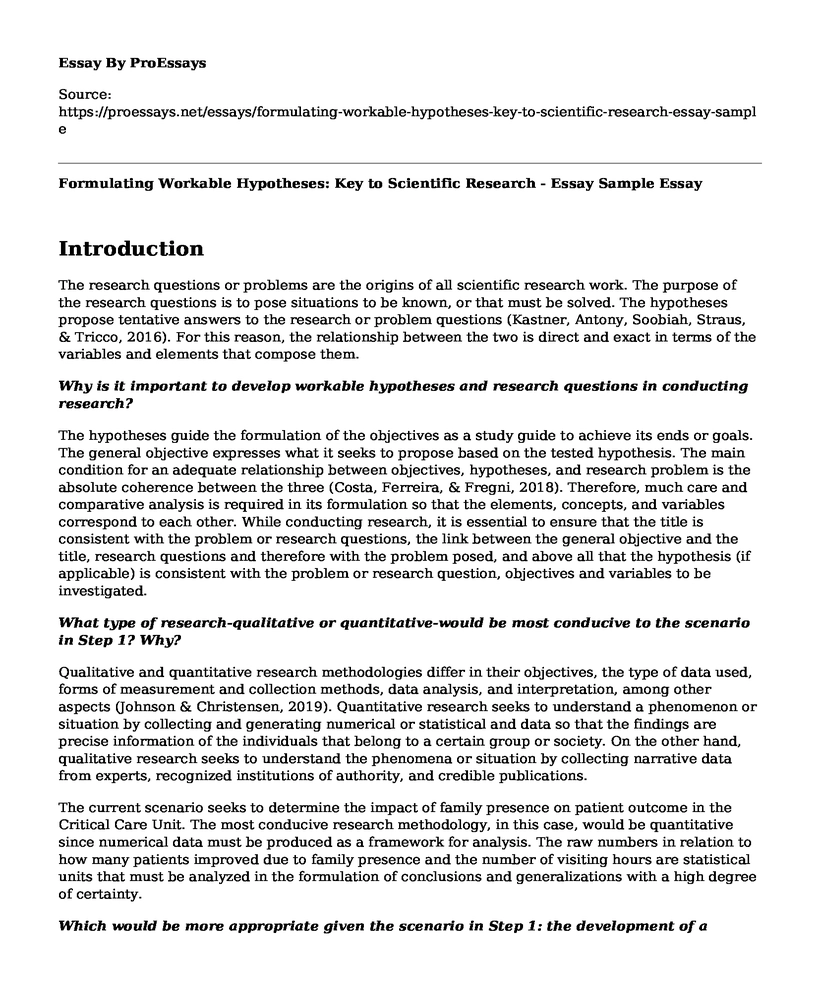Introduction
The research questions or problems are the origins of all scientific research work. The purpose of the research questions is to pose situations to be known, or that must be solved. The hypotheses propose tentative answers to the research or problem questions (Kastner, Antony, Soobiah, Straus, & Tricco, 2016). For this reason, the relationship between the two is direct and exact in terms of the variables and elements that compose them.
Why is it important to develop workable hypotheses and research questions in conducting research?
The hypotheses guide the formulation of the objectives as a study guide to achieve its ends or goals. The general objective expresses what it seeks to propose based on the tested hypothesis. The main condition for an adequate relationship between objectives, hypotheses, and research problem is the absolute coherence between the three (Costa, Ferreira, & Fregni, 2018). Therefore, much care and comparative analysis is required in its formulation so that the elements, concepts, and variables correspond to each other. While conducting research, it is essential to ensure that the title is consistent with the problem or research questions, the link between the general objective and the title, research questions and therefore with the problem posed, and above all that the hypothesis (if applicable) is consistent with the problem or research question, objectives and variables to be investigated.
What type of research-qualitative or quantitative-would be most conducive to the scenario in Step 1? Why?
Qualitative and quantitative research methodologies differ in their objectives, the type of data used, forms of measurement and collection methods, data analysis, and interpretation, among other aspects (Johnson & Christensen, 2019). Quantitative research seeks to understand a phenomenon or situation by collecting and generating numerical or statistical and data so that the findings are precise information of the individuals that belong to a certain group or society. On the other hand, qualitative research seeks to understand the phenomena or situation by collecting narrative data from experts, recognized institutions of authority, and credible publications.
The current scenario seeks to determine the impact of family presence on patient outcome in the Critical Care Unit. The most conducive research methodology, in this case, would be quantitative since numerical data must be produced as a framework for analysis. The raw numbers in relation to how many patients improved due to family presence and the number of visiting hours are statistical units that must be analyzed in the formulation of conclusions and generalizations with a high degree of certainty.
Which would be more appropriate given the scenario in Step 1: the development of a hypothesis or a research question or both? Why?
Both the hypothesis and research question are viable in the current scenario. Hypotheses are provisional answers to the central question or the research problem. Within the clinical research process, the posing of a correct research question, together with a concordant hypothesis and objectives are the roadmap that guides the scientific strategy and methodology (Doody & Bailey, 2016). For this reason, they are fundamental stages when proposing a study.
Countless questions arise during clinical care. It is only enough to reflect on the cases attended, their frequency, how the diagnosis is made, the indicated treatment, and their results. There are constantly reasons to carry out bibliographic searches and find out about what has been recently published. Through reading and study, an attempt is made to re-understand the topic of interest, and a theoretical framework is constructed that frequently results in new questions. Many of them have been - or have tried to be - answered previously; however, in current medicine, they apply the concepts of evidence-based medicine, and they are invited to read the literature critically, to base decisions on the best scientific evidence available. Thus, in this constant and critical search, it is common to find unsolved questions that require the generation of new knowledge. A typical research hypothesis in the current scenario would be: What is the impact of family presence on the patient outcome? The hypothesis would be: Family presence has a positive and beneficial effect on patient outcomes.
References
Costa, B. T., Ferreira, I. S., & Fregni, F. (2018). Generating a Hypothesis for an Oncology Study. In Methods and Biostatistics in Oncology (pp. 9-22). Springer, Cham.
Doody, O., & Bailey, M. E. (2016). Setting a research question, aim and objective. Nurse researcher, 23(4).
Johnson, R. B., & Christensen, L. (2019). Educational research: Quantitative, qualitative, and mixed approaches. SAGE Publications, Incorporated.
Kastner, M., Antony, J., Soobiah, C., Straus, S. E., & Tricco, A. C. (2016). Conceptual recommendations for selecting the most appropriate knowledge synthesis method to answer research questions related to complex evidence. Journal of clinical epidemiology, 73, 43-49.
Cite this page
Formulating Workable Hypotheses: Key to Scientific Research - Essay Sample. (2023, Jun 08). Retrieved from https://proessays.net/essays/formulating-workable-hypotheses-key-to-scientific-research-essay-sample
If you are the original author of this essay and no longer wish to have it published on the ProEssays website, please click below to request its removal:
- The Geography of Galapagos Islands and Kiribati - Research Paper
- Strategic Analysis of Campbell's Soup Company Paper Example
- Paper Example on Laminar and Turbulent Flow in Smooth Pipes
- Geology of Abu Dhabi: 150m High Dune Ridges & Evaporitic Flats - Essay Sample
- Research Misconduct: Plagiarism, Falsification, and Fabrication - Essay Sample
- Research Paper Sample on Secondary Analysis of Existing Data
- Australia's Information Privacy Laws - Research Paper Sample







